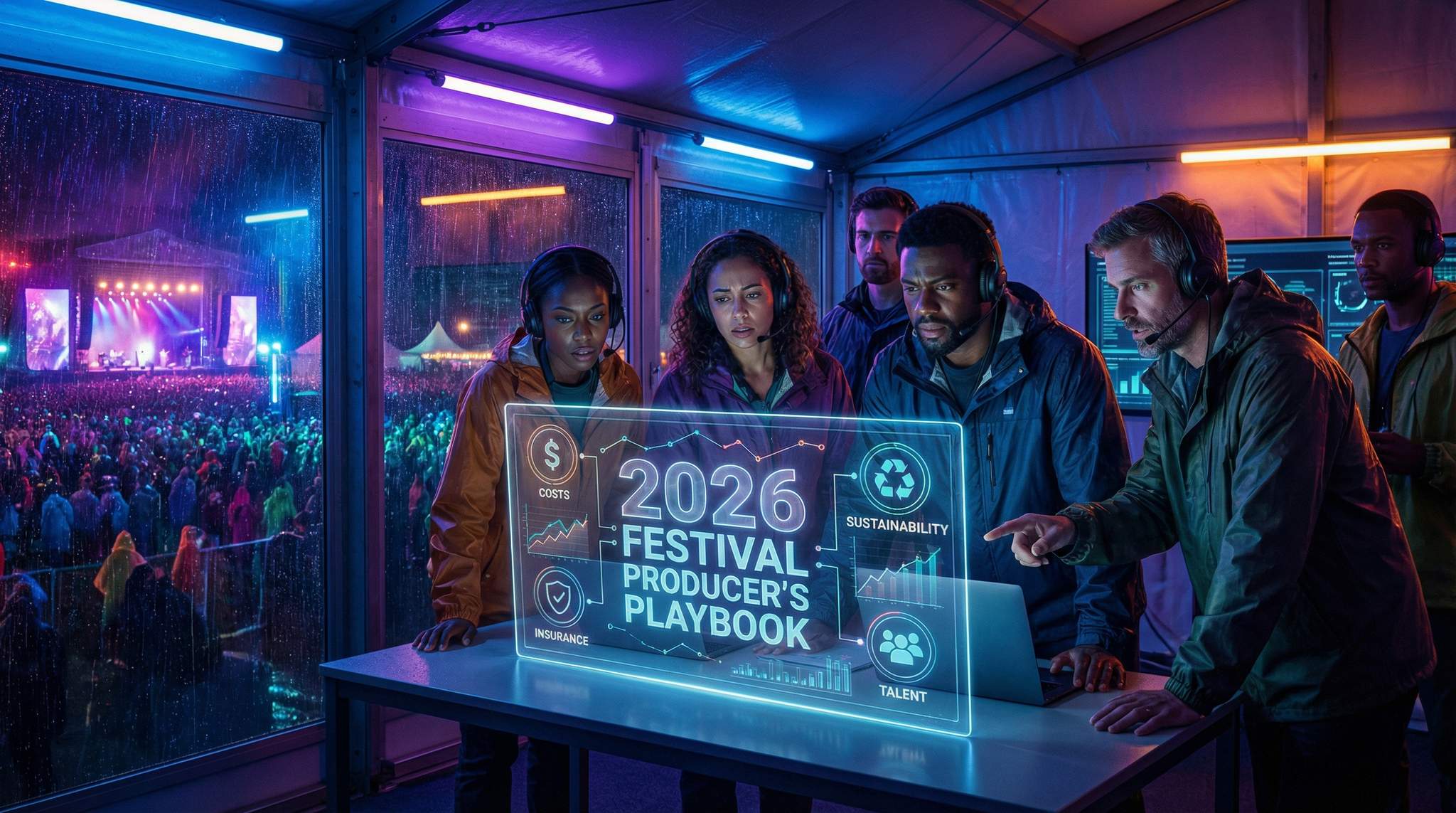Organizing a festival requires significant upfront capital – long before a single ticket is sold. Securing venues, booking talent, permits, and marketing all demand early funding. When ticket revenue isn’t available early, smart festival producers explore alternative funding sources to bridge the cash flow gap. The most seasoned organizers emphasize careful planning and creativity in financing. Below are several proven avenues for sourcing funds upfront, each with its own benefits and trade-offs.
Seeking Investors or Partners
One way festivals secure early funds is by bringing on investors or equity partners. This could be a private investor, a larger event promotion company, or a business partner willing to inject capital in exchange for a share of profits or ownership. Many successful large-scale festivals have grown with the backing of corporate partners or promoters – for example, major music festivals often partner with global event companies to access more resources. Investors provide a financial safety net and often valuable industry expertise, but their involvement comes at a cost in decision-making autonomy and profit sharing.
- Pros: Investors can supply substantial funding upfront, allowing the festival to pay deposits and startup costs without relying on ticket sales. They may also bring industry connections, credibility, and mentorship to help the festival succeed. Sharing the financial risk can make ambitious festival ideas feasible.
- Cons: Taking investor money usually means giving up some control. Investors will expect a return on investment or ownership stake, potentially influencing creative decisions or festival direction. Profit shares or equity given away reduce the organizer’s future earnings. It’s essential to have clear agreements to avoid conflicts over vision or finances.
Tip: Choose investment partners whose vision aligns with the festival’s mission. A well-aligned partner can act as a mentor and collaborator rather than just a financier. Always communicate expectations clearly – from how profits are split to who has final say on key decisions.
Crowdfunding and Community Support
For community-driven or nonprofit festivals, crowdfunding can be an effective way to raise early money. This approach rallies future attendees and supporters to contribute funds (often through platforms like Kickstarter or GoFundMe) in exchange for rewards or just the promise of a great event. Crowdsourcing funds taps into the festival’s core fan base and local community passion. Even established festivals have tried this approach in challenging times – notably, the Tribeca Film Festival launched a crowdfunding campaign in 2020 to help ensure its continuity during the pandemic, a strategy highlighted in FasterCapital’s analysis of event crowdfunding success stories.
Successful crowdfunding campaigns tell a compelling story about the festival’s purpose and offer enticing rewards to backers. For instance, a new indie music festival might offer supporters limited-edition merchandise, early access passes, or a “founders circle” VIP experience in return for their contributions. This method not only brings in money but also builds a sense of community ownership from the start.
Planning a Festival?
Ticket Fairy's festival ticketing platform handles multi-day passes, RFID wristbands, and complex festival operations.
- Pros: Crowdfunding can generate startup capital without requiring repayment or loss of ownership. It doubles as marketing, creating buzz and a loyal community of supporters before the festival even happens. It’s an inclusive way to involve the audience and gauge interest – strong backing can validate that the festival idea has demand.
- Cons: A crowdfunding campaign requires significant effort in marketing and outreach. There’s no guarantee the campaign will reach its funding goal; failing to hit the target could leave the event without funds and possibly harm credibility. Additionally, delivering the promised rewards (t-shirts, VIP perks, etc.) adds to costs and logistics. It works best for festivals with a clear niche or community appeal that people are excited to support directly.
Tip: Be transparent and engaging in the crowdfunding pitch. Break down how the money will be used (e.g., “30% to secure the venue, 50% to book artists, 20% for staging and permits”) and keep backers updated. Recognize contributors publicly and share behind-the-scenes progress to maintain momentum and trust. Imagina’s guide to festival financing emphasizes avoiding common mistakes regarding how the project is funded, while also suggesting that organizers focus on providing creative rewards to contributors.
Grants and Public Funding
Another avenue is to seek grants or public funding, especially for festivals with artistic, cultural, or economic development value. Governments, arts councils, and tourism boards often have grant programs for events that boost culture or local tourism. For example, a city tourism department might sponsor a food and wine festival to attract visitors during the off-season, or an arts council might give a grant to a film festival that supports independent filmmakers. These funds can significantly offset upfront costs if the event aligns with the grant’s goals.
Securing grants involves research and paperwork. Organizers should identify relevant opportunities – cultural arts grants, community development funds, heritage or tourism grants – and craft applications that highlight how the festival will benefit the community. It’s common for public grants to require a detailed budget and proof of other funding sources. As Imagina advises on identifying grants, meeting deadlines is paramount, and committees want to see that the project isn’t relying solely on their money and that the project is viable. Timing is crucial: grants often have annual cycles and deadlines, so applications must be submitted well in advance of the festival date.
- Pros: Grant funding is essentially “free” money that doesn’t dilute ownership or need to be paid back. It can lend prestige and legitimacy to the festival (being city-funded or an “award-winning event” is a marketing plus). Grants can also be sizable, covering major expenses if the event qualifies, and can jump-start a festival that aligns with public interests.
- Cons: The process is competitive and time-consuming. Applications can be complex, and there may be restrictions on how the funds are used. Approval isn’t guaranteed – one cannot bank on a grant until it’s confirmed – and decisions often come late, so organizers need contingency plans. Some grants disburse funds as reimbursements after the event or require matching funds, which means organizers still need some money upfront.
Tip: Start grant applications early and make sure to meet all requirements. Highlight how the festival will benefit the community or art form, and include letters of support from local partners if possible. Keep a backup plan for funding in case a grant falls through. If a grant is secured, acknowledge the grantor publicly – it fulfills any recognition requirements and builds goodwill for future support.
Corporate Sponsorships and Partnerships
Sponsorships are a cornerstone of festival financing. In this model, companies provide funding or in-kind resources (like products and services) in exchange for marketing exposure at the event. Unlike investors, sponsors typically don’t get a profit share; instead, they seek a return in brand visibility and engagement with the audience. A beer company might sponsor the main stage at a music festival, a local bank might underwrite a community fair, or a tech firm could fund a film festival’s digital lounge – all in return for logo placement and promotional opportunities. Sponsorship is a commercial exchange – the festival offers promotional value to the sponsor, and the sponsor provides cash or goods. Imagina describes this sponsorship dynamic as an interesting source involving product placement and sponsored activities.
Need Festival Funding?
Get the capital you need to book headliners, secure venues, and scale your festival production.
For example, a food festival could partner with kitchen appliance brands or food suppliers that sponsor cooking demonstration stages, supplying equipment and funds. Many world-famous festivals have multiple tiers of sponsors (e.g., “Presenting Sponsor,” “Official Beverage Partner”) whose combined contributions cover a large portion of the budget. These deals are often negotiated months in advance, and sponsorship money may come in installments leading up to the event.
- Pros: Sponsor funding can underwrite significant expenses, reducing reliance on ticket income. Sponsors might also provide valuable in-kind support – from free products to advertising – that lowers costs. Having reputable sponsors boosts credibility; their endorsement signals that the festival is professional and worthwhile. Additionally, sponsor partnerships can extend marketing reach, as sponsors promote the event to their audiences.
- Cons: Sponsors expect value and visibility, which can influence festival content and branding. Organizers must balance sponsor requirements (such as exclusive rights or prominent branding) with attendee experience – too many logos or ads can turn off the audience. There’s also risk in depending on sponsors: if a major sponsor backs out last-minute or doesn’t renew next year, it can leave a budget hole. Managing sponsor relationships and deliverables adds another layer of work for the festival team.
Tip: Seek sponsors that naturally fit the festival’s theme and demographic – this makes the partnership authentic and more effective. Prepare a clear sponsorship package that outlines what a sponsor gets at each support level (for example, branding on signage, mentions on social media, free VIP tickets for their clients). Deliver on all promises to sponsors and give them a great experience; a satisfied sponsor is more likely to return in future years.
Early-Bird Ticket Sales and VIP Pre-Sales
When ticket revenue isn’t available yet, festival organizers can generate some by selling tickets in advance. Early-bird ticket sales involve offering a limited batch of tickets well before the festival (often at a discounted rate) to generate initial cash flow. Many festivals use this strategy successfully: for instance, some major music festivals release tickets 6–9 months ahead of the event and even sell out their early allotment, providing vital funds to kickstart operations. If a festival has built any buzz or has loyal fans, early-bird sales reward those eager attendees while giving organizers immediate working capital.
Another approach is pre-selling VIP passes or special packages. This could include premium experiences such as all-access passes, meet-and-greet opportunities, or bundled deals with accommodations and merch. These high-value sales to super-fans or local businesses can inject substantial cash upfront. For example, a festival might offer a limited “Founders VIP Package” that includes lifetime entry or exclusive on-site benefits at a high price point – appealing to those who deeply believe in the event’s mission (and have the means to support it).
- Pros: Advance ticket sales directly turn audience excitement into early funding. They also help gauge interest and lock in a base attendance. The infusion of cash can cover deposits for artists, venue rentals, or early marketing. VIP pre-sales, in particular, bring in more dollars per ticket and can create an elite tier of supporters who feel personally invested in the festival’s success.
- Cons: Offering tickets at a discount means sacrificing some potential revenue later, and organizers must deliver the event as promised to avoid refunds and reputation damage. Relying on early sales can be risky if they don’t meet expectations – the festival might still fall short on funds. There’s also a long lead time to manage: buyers who purchase far in advance need to be kept engaged and informed. Plus, any change in festival plans (dates, headliners, etc.) could necessitate handling exchanges or refunds, which can strain early finances if not managed carefully.
Tip: Use early-bird sales strategically. Time the launch to coincide with a buzzworthy announcement (dates release, venue reveal, or teaser of the lineup) to maximize interest. Limit the number of discounted tickets to create urgency and preserve revenue for later sales. Keep careful track of the funds raised through pre-sales and earmark what expenses they will cover – don’t spend all the early income without a plan, as reserves may be needed for last-minute costs or to refund tickets if unforeseen issues arise.
Balancing and Combining Funding Sources
In practice, festival financing often involves a combination of these sources. A savvy organizer might blend a bit of each: for example, securing a small investor, running a community crowdfunding campaign, obtaining a city grant, signing a couple of key sponsors, and selling early-bird tickets all at once. Using multiple funding channels diversifies risk – if one source comes up short, others can help fill the gap. It’s the same principle as diversifying an investment portfolio: multiple revenue streams create a safety net for the project.
That said, managing diverse funding sources requires clear accounting and communication. Each funding source comes with obligations: investors expect updates and a return, sponsors need fulfillment of their perks, grantors require reports and public acknowledgment, and early ticket buyers expect an amazing experience. Keeping a detailed budget and cash flow timeline is critical. Map out when each influx of funds will arrive and which costs it will cover so they can avoid shortfalls. For instance, if grant money will only be paid after the event, the team will know to cover pre-event costs through other means like sponsor payments or early ticket revenue.
Conclusion: Funding a festival upfront is one of the toughest challenges for a new producer, but it’s also an opportunity to build a strong foundation for the event. Each funding option – whether sharing equity, rallying the community, enlisting public support, partnering with brands, or preselling tickets – comes with advantages and responsibilities. There is no one-size-fits-all solution; the best approach often mixes several sources to fit the festival’s unique goals and context. The next generation of festival organizers can learn from past successes and failures: for example, how smart early ticket sales kept one event afloat, or how over-reliance on a single sponsor put another at risk. By planning ahead, staying flexible, and aligning funding methods with the festival’s values, producers can secure the upfront money needed to turn their vision into a thriving festival reality.





